The activities of sea pirates and oil spills have continued unabatedly in the coastal community of Ibeno Local Government Area of Akwa Ibom State, and fishermen there have continued to count their losses.
They described horrifying incidents that occurred during fishing expeditions, particularly the attack by pirates and the danger posed by gas flare-ups.
The result of all these hiccups is a lack of fish and an increase in the cost of the few that are still available.
According to insider reports, this has made eating fish in Akwa Ibom comparable to living by a river’s edge and washing one’s hands in spit.
Ibeno, one of the coastal oil-producing communities in Akwa Ibom State that only engages in fishing, occupies an area of more than 1,200 square kilometers, extending from the village of Atabrikang on its western flank to Okposo I on its eastern flank, bordering the Mbo Local Government Area and the Bakassi Peninsula.
It shares a border with the local governments of Eket, Esit Eket, Onna, and Eastern Obolo and is bordered by the Atlantic Ocean to the south.
Although the oil giant has announced plans to sell its assets to Seplat in order to move into deeper waters, Ibeno is home to the Mobil/Exxon QIT terminal where crude oil is processed for export throughout the world.
The community has requested that the multinational company clean up the mess in the community before divesting because their activities have undoubtedly had a negative impact on the community’s primary source of income, which is fishing.
Members of the community took turns speaking at a capacity-building workshop held by the Health of Mother Earth Foundation, HoMEF, at Okoro Utip hall, Ibeno, about how incidents of piracy and oil spills have negatively impacted them.
Ukeme Walter, a fisherman, bemoaned the demise of fish and other aquatic life due to oil spills, explaining that the few remaining fish have moved down to the high sea, which is extremely dangerous for fishermen.
“Gas flaring is significantly disturbing our water, and we don’t have good access to our businesses in terms of fishing,” he complained. Fish used to live close to our ocean, but now you have to travel into the high sea, which requires several litres of fuel.
When you go to the sea, you might not even see the fish, and the ones you do see won’t even make up for your initial investment when you sell them.
He continued by saying that oil spills have an impact on their nets and engine boats in addition to killing marine life.
He claims, “The oil in the water ruins our nets, which is very expensive, and we keep fixing engines. Gas flares in the water can occasionally prevent you from catching fish if you cast your net there.
One Ime Ben revealed, while recounting his experience at the hands of sea pirates, that the thugs always strike when the sea storm intensifies.
“When the sea storm comes, we divert to a safe place to land; they would come there, attack us, and take away all our possessions, including nets and boat engines, which cost about three million Naira each. They always attack at 2 or 3 in the morning when our men go out fishing.
“When we move to the water, they go to the border between Nigeria and Cameroon; some of them they will collect the engine and the boat, some of them if they like you, they will carry you and drop you where you can come out; some of them they will ask you to jump inside the sea and you know you cannot swim in such a magnitude of water even though you know how to swim; many people have died,” he said.
Speaking at the workshop, Stephen Oduware, Project Lead for HOMEF, expressed regret that, despite the nation’s exploitation of the coastal region’s natural resources for food production, the residents have not reaped rewards commensurate with their contributions.
The right to health, a decent job, and a healthy environment are just a few of the rights he urged them to organize for in order to demand from the appropriate authorities.
This is a request to the government, as these people are among the most underrepresented and underserved, Oduware said. Thus, the government needs to take more steps to safeguard these citizens and their businesses. They are the ones who feed the country, so they should provide the infrastructure they need to grow their businesses.
We can’t do it all, so information is essential. We are in favor of a proper building, like a port, where fishermen will have access to things like freezers, contemporary drying cans, and a reliable storage system.
The director of Kebetkache Women Development and Resource Center, Obongawan Emem Okon, lamented the consequences of oil spills and gas flaring, particularly in the Niger Delta region, highlighting how these have hurt fishermen and their livelihoods.
Okon declared that she was no longer in favor of women’s emancipation and that women from riverine communities should instead be educated enough to demand their rights and entitlements.
She urged lawmakers to support such demands.
The government needs to support women immediately because they play a crucial role in the fishery industry, she continued.









